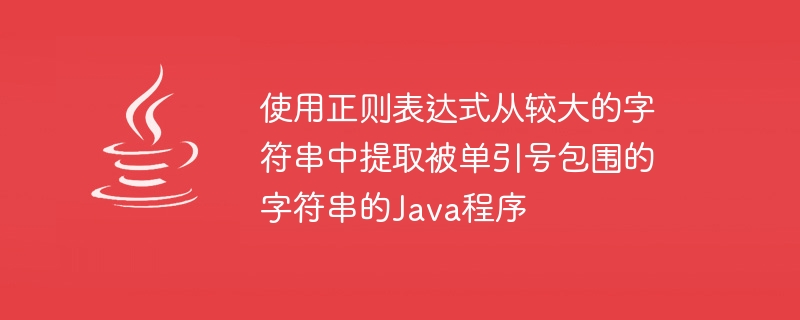Home >Java >javaTutorial >Java program to extract a string surrounded by single quotes from a larger string using regular expressions
Java program to extract a string surrounded by single quotes from a larger string using regular expressions
- PHPzforward
- 2023-09-16 16:41:021125browse

Regular expressions or regular expressions are a language used for pattern matching and string manipulation. It consists of a sequence of characters that defines a search pattern and can be used to perform operations such as searching, replacing, and even validating text input. Regular expressions consist of a sequence of characters and symbols that form a search pattern.
In this article, we will learn how to write a Java program to extract a single-quoted string from a larger string using regular expressions.
Java provides support for regular expressions through the java.util.regex package. Pattern classes represent compiled regular expressions, while matcher classes can be used to match patterns against a given input string.
A single substring enclosed in single quotes
In the following example, we will first define the input string and the regular expression pattern we want to match. The pattern "(_ ?)" matches any sequence of characters enclosed in single quotes and _*? parts. Match any character 0 or more times, but as few times as possible so that the rest of the pattern matches.
We then create a Matcher object based on the pattern to apply to the input string with the help of the find method. If the pattern matches, we extract the matching string using the group() method with parameter 1, which represents the first capturing group in the pattern. The disadvantage of this method is that it does not capture all single-quoted substring groups.
Example
import java.util.regex.Matcher;
import java.util.regex.Pattern;
public class StringExtractor {
public static void main(String[] args) {
String input = "This is a 'single quote' enclosed string";
Pattern pattern = Pattern.compile("'(.*?)'");
Matcher matcher = pattern.matcher(input);
if (matcher.find()) {
String extractedString = matcher.group(1);
System.out.println(extractedString);
}
}
}
Output
single quote
Multiple substrings enclosed in single quotes
The above method has a major disadvantage, that is, it is too simple to extract multiple single-quote substrings from the input string, and only extracts the first occurrence. This is an updated and advanced version of the previous method as it is capable of extracting multiple events. We use a while loop to iterate and continue searching for matches until there are no matches left in the input string. A list of matches is used to store all extracted strings and is returned by this method. The main method demonstrates how to use the updated extractStringsWithRegex() method to extract all single-quoted strings.
Example
import java.util.regex.Matcher;
import java.util.regex.Pattern;
import java.util.ArrayList;
import java.util.List;
public class StringExtractor {
public static List<String> extractStringsWithRegex(String input) {
// This function takes string as input, iterates over to search for regex matches
// and stores them in a List named matches which is finally returned in the end
Pattern pattern = Pattern.compile("'(.*?)'");
Matcher matcher = pattern.matcher(input);
List<String> matches = new ArrayList<>();
while (matcher.find()) {
matches.add(matcher.group(1));
}
return matches;
}
public static void main(String[] args) {
String input = "This is a 'test' string with 'multiple' 'single quote' enclosed 'words'";
List<String> matches = extractStringsWithRegex(input);
for (String match : matches) {
System.out.println(match);
}
}
}
Output
test multiple single quote words
There are some advantages and disadvantages to the java program for extracting a single quoted string from a larger string using regular expressions as shown below.
advantage
Regular expressions are very powerful and can match strings enclosed in single quotes or even more complex patterns.
The Matcher class provides us with additional methods for processing matching strings, such as finding the starting and ending index of a match.
shortcoming
Regular expressions can be more difficult to write and understand than other methods.
Regular expressions can be slower than other methods, especially for large input strings or complex patterns.
in conclusion
There are several methods for extracting a string enclosed in single quotes, but the most common methods are using regular expressions, split() and substring() methods. Regular expressions are powerful and flexible options because they can handle complex patterns, but can be very time-consuming on very large strings. When using regular expressions, the Pattern class is used to represent the pattern, and the Matcher class is used to apply the pattern to the input string and then extract the matching text. Regular expressions have a variety of use cases, from validating user input data to manipulating text. Whenever working with regular expressions, it is important to carefully design and test the pattern to ensure that it matches the required text and handles all possible edge cases well.
The above is the detailed content of Java program to extract a string surrounded by single quotes from a larger string using regular expressions. For more information, please follow other related articles on the PHP Chinese website!

